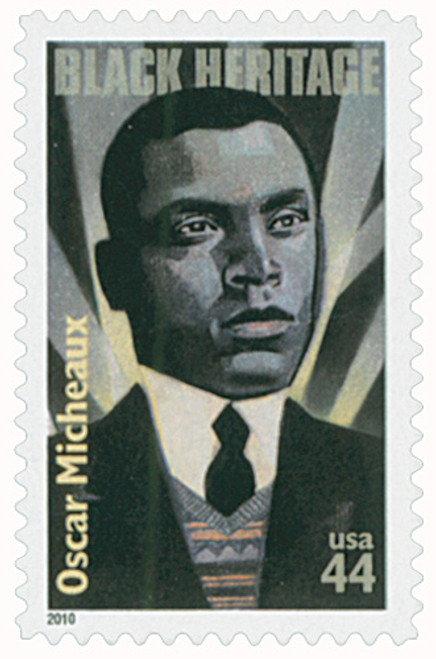
# 4464/5349 - 2010s Black Heritage Collection, 10 stamps
Are You Missing These 2010s Black Heritage Series Stamps?
Introduced in 1978, the Black Heritage Series is one of the USPS’s longest-running and most popular stamp series. This is your chance to own all the Black Heritage stamps issued in the 2010s in one easy, time- and money-saving order. These stamps honor:
The father of black cinema, Oscar Micheaux made movies that were a radical departure from Hollywood. He produced Within Our Gates – showing racial discrimination, lynching, and other white-on-black violence. He also moved away from the usual Hollywood stereotype of African Americans being servants or buffoons. At a time when most black filmmakers were going bankrupt, Oscar Micheaux thrived.
Barbara Jordan made history when she became the first black woman elected to the Texas State Senate. By 1972, she Jordan was the highest-ranking member of the Texas legislature. She was twice the keynote speaker at the Democratic National Convention.
John H. Johnson was the most influential black publisher in US history, most noted for Ebony, the world’s largest black-owned magazine. Over the course of his 60-year publishing career, Johnson helped destroy stereotypes, advance the cause of civil rights, and encourage pride among black Americans.
Tennis player Althea Gibson won the ATA singles tournament ten years in a row but was banned from more prestigious events because of her race. When she finally was admitted, Gibson made history by becoming the first black person to win a Wimbledon title, the French Open in both singles and doubles, the doubles title at the Australian Open, and the US Open.
Shirley Chisholm was the first African-American woman in Congress. She was a co-founding member of the Congressional Black Caucus and served seven consecutive terms representing New York’s 12th Congressional District.
Robert Robinson Taylor was the first black student to attend the Massachusetts Institute of Technology (MIT). When he graduated in 1892, he became the first fully accredited African-American architect in America. He went on to teach at the Tuskegee Institute in Alabama and designed the school’s Science Hall chapel.
Richard Allen created the African Methodist Episcopal (AME) Church and was ordained its first bishop. The early black congregations he fostered, and their abolitionist efforts are often credited with beginning the civil rights movement.
Dorothy Height was an influential leader of the civil rights movement for over 70 years. It was Height’s counsel that inspired President Dwight D. Eisenhower to desegregate schools and President Lyndon B. Johnson to appoint African American women to government positions.
Lena Horne was one of the great icons of the 20th century. She spent over 70 years in the entertainment industry as an actress and jazz singer and was also an acclaimed civil rights activist.
Gregory Hines had a charisma and talent for improvisation shined on stage and screen. Initially earning fame as a tap dancer, he eventually appeared in nearly 50 movies and television shows. His 1989 film Tap was credited with popularizing the style with modern audiences by combining it with modern music.
Add all this important history to your collection – send for yours now.
Are You Missing These 2010s Black Heritage Series Stamps?
Introduced in 1978, the Black Heritage Series is one of the USPS’s longest-running and most popular stamp series. This is your chance to own all the Black Heritage stamps issued in the 2010s in one easy, time- and money-saving order. These stamps honor:
The father of black cinema, Oscar Micheaux made movies that were a radical departure from Hollywood. He produced Within Our Gates – showing racial discrimination, lynching, and other white-on-black violence. He also moved away from the usual Hollywood stereotype of African Americans being servants or buffoons. At a time when most black filmmakers were going bankrupt, Oscar Micheaux thrived.
Barbara Jordan made history when she became the first black woman elected to the Texas State Senate. By 1972, she Jordan was the highest-ranking member of the Texas legislature. She was twice the keynote speaker at the Democratic National Convention.
John H. Johnson was the most influential black publisher in US history, most noted for Ebony, the world’s largest black-owned magazine. Over the course of his 60-year publishing career, Johnson helped destroy stereotypes, advance the cause of civil rights, and encourage pride among black Americans.
Tennis player Althea Gibson won the ATA singles tournament ten years in a row but was banned from more prestigious events because of her race. When she finally was admitted, Gibson made history by becoming the first black person to win a Wimbledon title, the French Open in both singles and doubles, the doubles title at the Australian Open, and the US Open.
Shirley Chisholm was the first African-American woman in Congress. She was a co-founding member of the Congressional Black Caucus and served seven consecutive terms representing New York’s 12th Congressional District.
Robert Robinson Taylor was the first black student to attend the Massachusetts Institute of Technology (MIT). When he graduated in 1892, he became the first fully accredited African-American architect in America. He went on to teach at the Tuskegee Institute in Alabama and designed the school’s Science Hall chapel.
Richard Allen created the African Methodist Episcopal (AME) Church and was ordained its first bishop. The early black congregations he fostered, and their abolitionist efforts are often credited with beginning the civil rights movement.
Dorothy Height was an influential leader of the civil rights movement for over 70 years. It was Height’s counsel that inspired President Dwight D. Eisenhower to desegregate schools and President Lyndon B. Johnson to appoint African American women to government positions.
Lena Horne was one of the great icons of the 20th century. She spent over 70 years in the entertainment industry as an actress and jazz singer and was also an acclaimed civil rights activist.
Gregory Hines had a charisma and talent for improvisation shined on stage and screen. Initially earning fame as a tap dancer, he eventually appeared in nearly 50 movies and television shows. His 1989 film Tap was credited with popularizing the style with modern audiences by combining it with modern music.
Add all this important history to your collection – send for yours now.














